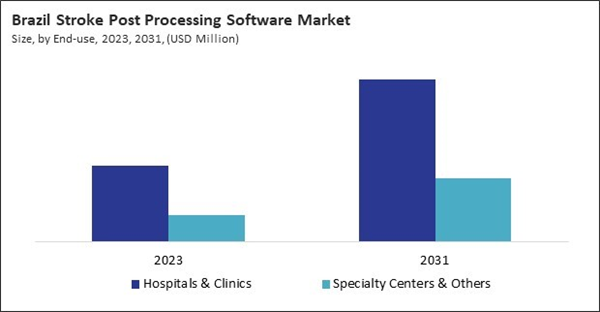The Brazil market dominated the LAMEA Stroke Post Processing Software Market by country in 2023, and is expected to continue to be a dominant market till 2031; thereby, achieving a market value of $7.27 millions by 2031. The Argentina market is showcasing a CAGR of 12.5% during 2024-2031. Additionally, the UAE market would register a CAGR of 10.3% during 2024-2031.
This capability is particularly valuable in time-sensitive scenarios, where precise information can mean the difference between recovery and permanent disability. Additionally, the software finds applications in research, where it is used to analyze large datasets of imaging studies to uncover new insights into stroke mechanisms and potential therapeutic targets.
Telemedicine is another growing application, with software enabling remote consultations by allowing specialists to access and interpret imaging data from distant locations, thus expanding access to expert care in underserved regions. The adoption of stroke post processing software has gained significant momentum, driven by technological advancements and the urgent need for improved stroke outcomes.
The increasing focus on healthcare infrastructure and investments in Argentina, the UAE, and Saudi Arabia fosters growth in advanced medical technologies, including stroke post-processing software. Stroke, a leading cause of disability and mortality worldwide, requires rapid diagnosis and effective treatment, making AI-driven post-processing software essential for improving patient outcomes. The UAE’s 2022 federal budget allocated USD 15.8 billion for public spending, with 8.4% dedicated to healthcare, signalling strong investment in medical advancements. Additionally, UAE Vision 2040 prioritizes healthcare, reinforcing the country’s role as a regional hub for medical technology distribution. As the UAE continues to expand its telemedicine and AI healthcare ecosystem, integrating stroke post-processing software into medical imaging platforms is likely to accelerate. Saudi Arabia contributes 60% of the GCC’s total healthcare expenditures and allocated $50.4 billion (16.96% of its budget) to healthcare and social development in 2023. This substantial investment, second only to education, reflects the government’s commitment to enhancing medical services. Given the rising prevalence of stroke cases due to lifestyle diseases like hypertension and diabetes, Saudi Arabia is investing in advanced diagnostic tools, including AI-driven stroke post-processing software. In conclusion, the rising healthcare investments in the UAE, Saudi Arabia, and Argentina drive the adoption of stroke post-processing software.
List of Key Companies Profiled
- Brainomix Limited
- Viz.ai, Inc.
- GE HealthCare Technologies, Inc.
- Siemens Healthineers AG (Siemens AG)
- Koninklijke Philips N.V.
- Canon, Inc. (Canon Medical Systems Corporation)
- Terarecon, Inc.
- Nicolab B.V.
- Medtronic PLC
- iSchemaView Inc. (RapidAI)
Market Report Segmentation
By Installation
- Desktop
- Mobile Phones & Tablets
By Modality
- MRI
- CT Scan
By Type
- Ischemic Stroke
- Hemorrhagic Stroke
- Other Type
By End-use
- Hospitals & Clinics
- Specialty Centers & Others
By Country
- Brazil
- Argentina
- UAE
- Saudi Arabia
- South Africa
- Nigeria
- Rest of LAMEA
Table of Contents
Companies Mentioned
- Brainomix Limited
- Viz.ai, Inc.
- GE HealthCare Technologies, Inc.
- Siemens Healthineers AG (Siemens AG)
- Koninklijke Philips N.V.
- Canon, Inc. (Canon Medical Systems Corporation)
- Terarecon, Inc.
- Nicolab B.V.
- Medtronic PLC
- iSchemaView Inc. (RapidAI)









